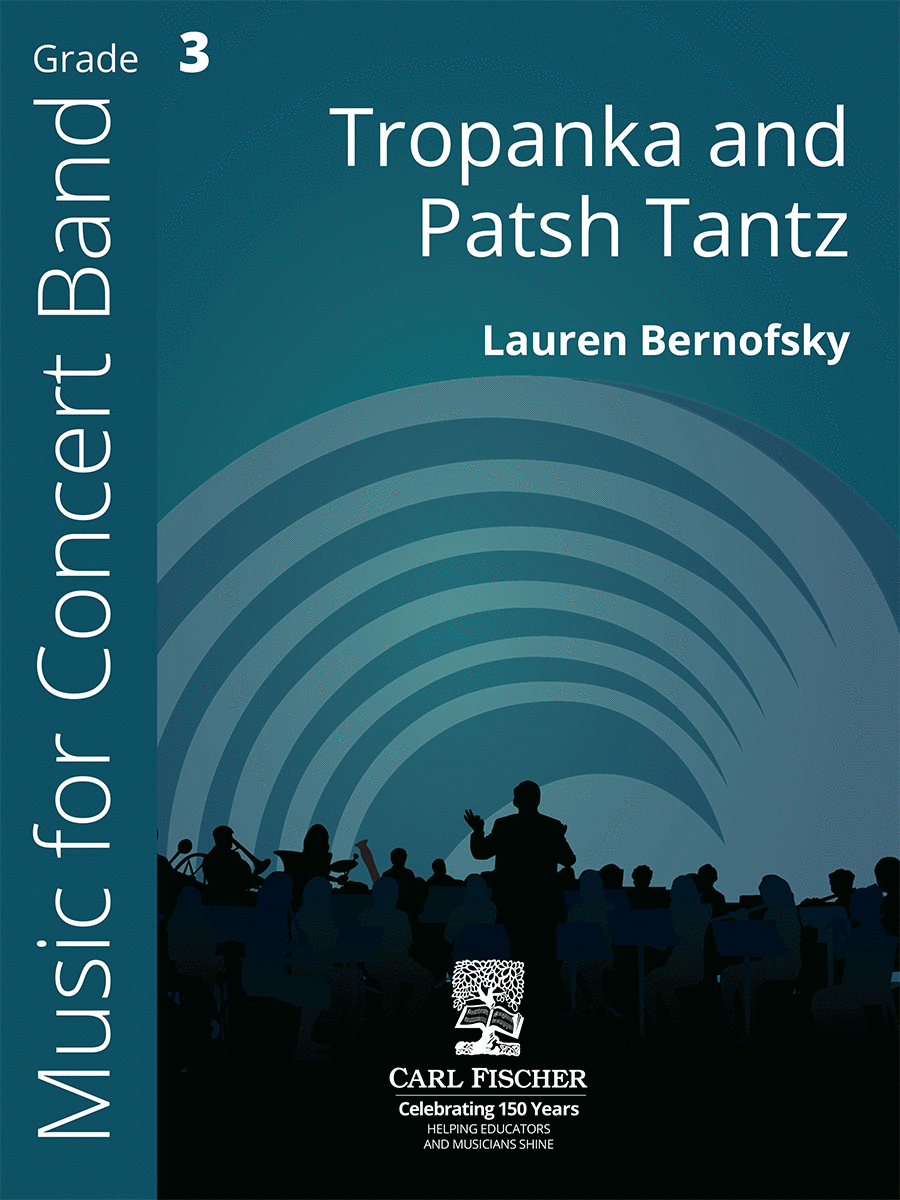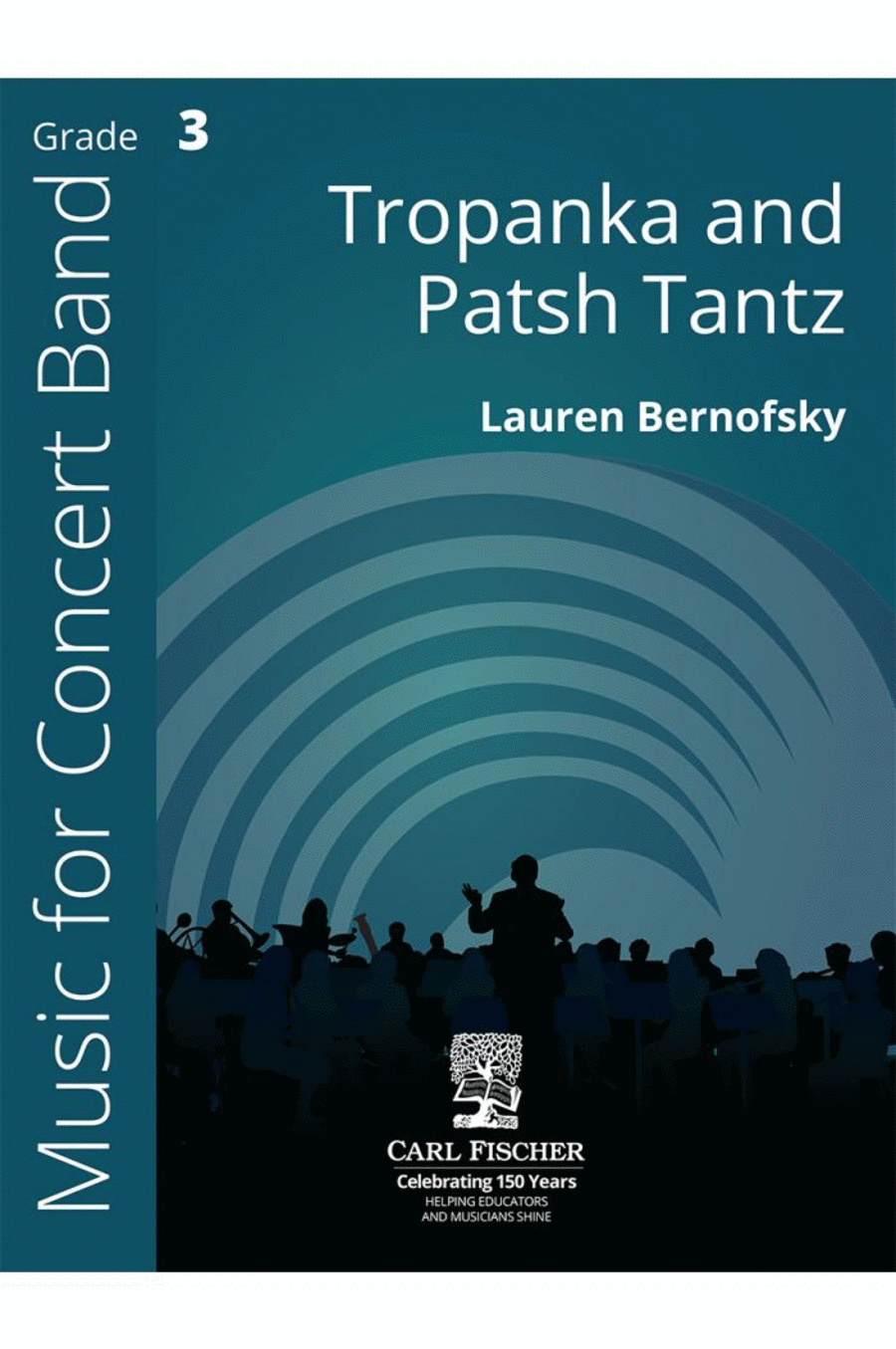Band Bass Clarinet, Bass Drum, Bassoon 1, Bassoon 2, Clarinet 1, Clarinet 2, Clarinet 3, Flute 1, Flute 2, Oboe 1, Oboe 2, Percussion 1, Percussion 2, Percussion 3, Piccolo, Ride Cymbal, Tambourine, Tom-tom, Triangle, Wood Block, alto Saxophone 1 and more. - Grade 3
SKU: CF.CPS264F
Composed by Lauren Bernofsky. Cps. Full score. 28 pages. Duration 3 minutes, 39 seconds. Carl Fischer Music #CPS264F. Published by Carl Fischer Music (CF.CPS264F).
ISBN 9781491161746. UPC: 680160920433.
Some of the first music I remember hearing as a child was folk dance music from around the world. My parents were avid folk dancers, and they used to host weekly folk dance evenings in our basement. Some nights, when I was supposed to be in bed, I would stand with my ear to the door, listening to this fascinating music that drifted up the stairs. I didn't know what each piece was, but the melodies have stayed with me. Tropanka is one of those tunes. Tropanka (pronounced tro-PAHN-kuh) is a folk dance from Bulgaria, and the title means stomping dance. One can hear two repeated notes at the end of each phrase - this is where the dancers stomp. Patsh Tantz (pronounced PAHTSH tahnts) is a classic example of Klezmer, which is East European Jewish folk music. The title is Yiddish for clapping dance, and all the players get the chance to clap at certain points in their individual part. Klezmer music is often quite exciting, and this arrangement includes the characteristic accelerando, building excitement as the piece drives to the end. Both movements should be played rhythmically, and as it is folk music that would be danced to by untrained dancers, often wearing boots or other flat-soled shoes, adding weight to many of the downbeats will help bring out the earthy character of the music. Since my parents met while folk dancing, I made these arrangements (originally in a version for string quartet) as a gift in celebration of their 50th wedding anniversary.
Some of the first music I remember hearing as a child was folk dance music from around the world. My parents were avid folk dancers, and they used to host weekly folk dance evenings in our basement. Some nights, when I was supposed to be in bed, I would stand with my ear to the door, listening to this fascinating music that drifted up the stairs. I didnât know what each piece was, but the melodies have stayed with me. Tropanka is one of those tunes. Tropanka (pronounced âtro-PAHN-kuhâ) is a folk dance from Bulgaria, and the title means âstomping danceâ. One can hear two repeated notes at the end of each phrase â this is where the dancers stomp. Patsh Tantz (pronounced âPAHTSH tahntsâ) is a classic example of Klezmer, which is East European Jewish folk music. The title is Yiddish for âclapping danceâ, and all the players get the chance to clap at certain points in their individual part. Klezmer music is often quite exciting, and this arrangement includes the characteristic accelerando, building excitement as the piece drives to the end.Both movements should be played rhythmically, and as it is folk music that would be danced to by untrained dancers, often wearing boots or other flat-soled shoes, adding weight to many of the downbeats will help bring out the âearthyâ character of the music. Since my parents met while folk dancing, I made these arrangements (originally in a version for string quartet) as a gift in celebration of their 50th wedding anniversary.
Publisher : Carl Fischer $13.00 - See more - Buy online
$13.00 - See more - Buy online
 (AMERICAN COMPANY)
(AMERICAN COMPANY) 


